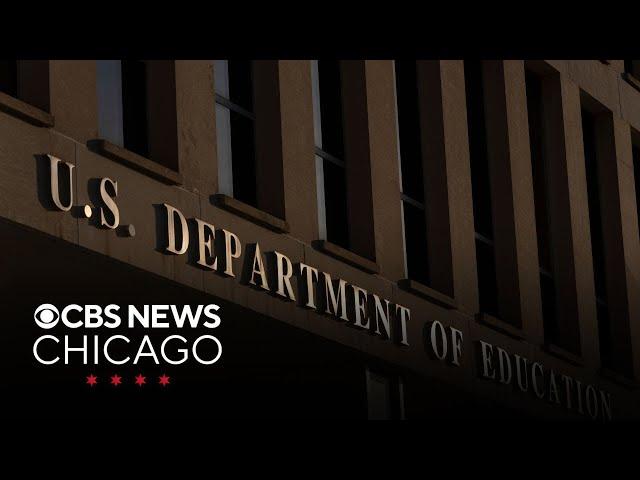Illinois Education Leadership Responds to Federal Funding Suspension
Illinois’ chief education officer has expressed strong disapproval of the recent federal decision to halt funding for essential education initiatives. This abrupt funding freeze, enacted under the Trump administration, poses notable challenges for schools statewide, notably those serving underprivileged communities. Educators and school leaders warn that this interruption jeopardizes critical programs designed to enhance student achievement and classroom quality.
- Postponed facility and technology upgrades: Planned improvements to school infrastructure and digital tools face delays.
- Suspended professional growth: Training programs aimed at boosting teacher effectiveness are currently on hold.
- Uncertain funding for specialized services: Programs supporting students with disabilities and English learners risk significant cutbacks.
The Illinois education leader highlighted that such interruptions in federal funding could deepen educational inequities over time. While state and local authorities are exploring stopgap measures, they acknowledge these are insufficient substitutes for consistent federal investment.
Effects on Disadvantaged Students and Resource Management
The sudden withdrawal of federal education funds has profoundly impacted Illinois schools, with the most severe consequences felt by vulnerable student groups. Low-income students, those with disabilities, and English language learners are encountering increased obstacles as essential support services diminish. Programs tailored to these populations, often reliant on federal dollars, are now stretched thin, threatening students’ academic success and overall well-being. Reports from educators indicate growing class sizes and fewer individualized supports, which disproportionately affect those who rely heavily on public education to overcome systemic barriers.
Resource constraints have forced difficult decisions, including:
- Eliminating extracurricular and enrichment activities that benefit at-risk youth
- Reducing access to counseling and mental health services amid rising student needs
- Delaying necessary facility repairs to maintain safe learning environments
- Postponing upgrades to technology critical for hybrid and remote instruction
| Service Area | Severity of Impact | Immediate Effects |
|---|---|---|
| Special Education | Severe | Reduction in aide support and therapy sessions |
| English Language Learners | Moderate | Fewer tutoring hours and learning materials |
| Mental Health Services | Severe | Longer wait times for counseling |
| Technology Access | Moderate | Delays in device replacements and upgrades |
These cutbacks risk widening achievement gaps, underscoring the necessity of sustained federal funding. Illinois’ dedication to educational equity is being tested as districts strive to manage these challenges.
State Initiatives to Counteract Funding Gaps
In light of the federal funding freeze,Illinois state officials have acted swiftly to alleviate financial pressures on schools,especially those serving the most vulnerable students. The Illinois State Board of Education is reallocating state emergency funds to maintain critical programs for low-income and special education students. Additionally, state leaders are urging the legislature to increase education appropriations and develop contingency plans to prevent further disruptions.
Key strategies currently being implemented include:
- Adjusting the state budget to prioritize education expenditures
- Advocating for the reinstatement of federal grants through congressional engagement
- Forming task forces to evaluate and optimize the use of limited resources
- Partnering with local districts to identify and implement cost-saving measures
| Initiative | Objective | Progress |
|---|---|---|
| State Budget Reallocation | Ensure continuity of essential services | Ongoing |
| Federal Funding Advocacy | Restore suspended federal grants | Active |
| Resource Optimization Task Forces | Maximize impact of available funds | Established |
| Operational Efficiency Programs | Reduce unnecessary expenditures | In progress |
Demanding Federal Responsibility and Reinstatement of Support
The abrupt halt in federal education funding has drawn sharp criticism from Illinois’ education leaders. Dr. Carmen Ayala, the state’s schools chief, described the freeze as “profoundly disruptive,” particularly for efforts aimed at supporting marginalized communities and maintaining school operations during challenging times.She has called for an immediate recommitment from the federal government to public education funding to prevent further setbacks in educational equity.
Advocates warn that without renewed federal assistance, schools will struggle to:
- Recruit and retain qualified educators
- Provide essential special education and mental health services
- Implement necessary technology upgrades for remote learning environments
- Maintain after-school programs that promote student growth and engagement
| Funding Category | Effect of Suspension |
|---|---|
| Title I Grants | Reduced support for economically disadvantaged students |
| IDEA Funding | Cutbacks in special education resources |
| School Nutrition Programs | Threats to food security for vulnerable children |
Conclusion: The Future of Education Funding in Illinois
As the debate over federal education funding continues, Illinois remains resolute in its demand for restored financial support to meet the pressing needs of public schools. State education officials warn that the Trump administration’s funding freeze risks reversing progress and deepening existing disparities, highlighting the far-reaching consequences of federal policy decisions on local education systems. Stakeholders across Illinois are closely monitoring developments, hopeful for a resolution that will reinstate vital resources and protect the educational futures of students statewide.





